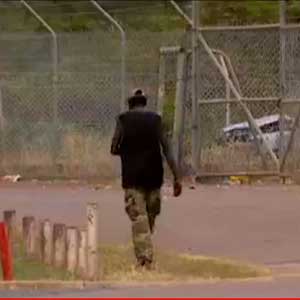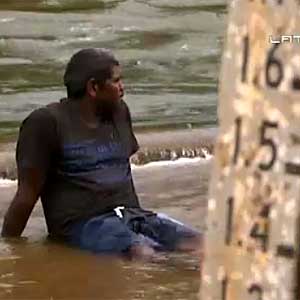Cultural wall sees Indigenous men miss welfare pay
 ILC Keeping Aboriginal men in the long grass
ILC Keeping Aboriginal men in the long grass
Kate Wild ABC Lateline 13 June 2013
A culture barrier is leading young Indigenous Australians in remote Northern Territory communities to miss out on welfare payments.
Experts are calling on the Federal Government to identify and manage the cultural barriers, concerned domestic abuse arises from money disputes in outback communities.
The number of young Aboriginal men out of work in the remote NT has been hovering around 60 per cent for the last 20 years.
Local economies are tiny in these remote towns, and cannot provide jobs for everyone who wants one.
Daly River, 200 kilometres south of Darwin, is typical of Aboriginal communities across the state.
Half the population is under 25 and according to the latest Census, most men in their teens and early 20s do not have a job and are not looking for one.
Centrelink payments are often the only source of income in remote towns like Daly River, but hundreds of young Aboriginal men are not pursuing the payments due to culture gaps.
Without a job or government money, they are living on nothing.


Dion Munngin, Daly River
A number of young men who spoke to the ABC's Lateline say they resent some Centrelink payment requirements, particularly having to train for jobs they say do not exist in remote communities.
Northern Territory resident Dion Munngin's closest Centrelink office is about 200km away.
He can call them, but getting through to speak to someone can take hours.
Mr Munngin says it is a "waste of time" to try and remain on Centrelink.
"If you don't be on time for your appointment or be there to a set date that you were given then they cut you off, and then you have to ring them back and give them a reason why you weren't there," Mr Munngin said.
"It's just a lot of hard work really."
Young men 'embarrassed' by language barriers
Nikita Jason's husband works in the mines on a fly-in, fly-out basis when there are jobs. He is not working at the moment and he is not on the dole either.
Ms Jason says Centrelink is too difficult to deal with.
"He just doesn't see the point in getting on the dole because it's just a big stuff around to him," Ms Jason said.
"He would rather work for a large pay than a measly $200 a fortnight or something like that."
Ms Jason says there are young men in Daly who experience real barriers to signing up for the dole.
"I think they're just embarrassed by their language," she said.
"Sometimes there's female Centrelink workers and they don't feel comfortable talking to them.
"They don't really know how to fill out the forms [out] ... I think that’s because of their literacy being so low from not going to school."
Until recently there have been no firm figures on the number of Aboriginal men living without an income in the Northern Territory.
Census figures were recently analysed for Lateline to produce the first hard data.
The figures, analysed by Doctor Nicholas Biddle from the Australian National University, show about 11 per cent of the male Indigenous population aged 15 to 24 in remote NT, are not working, not studying and not receiving an income.
But only 1 per cent of the non-Indigenous population is in the same position.
The figures mean about 600 young Aboriginal men in the state are choosing not to take up Centrelink money they are entitled to.
Dr Biddle says this probably underestimates the true figure.
Lack of money leads to social consequences: expert
Olga Havnen, a former co-ordinator general for remote service delivery in the NT, says the social consequences of young men having no money are serious.
"I think from talking to women, one of the things they say to me, a lot of the fights and family violence at home is about the lack of money," she said.
Ms Havnen says she has been drawing the Government's attention to the plight of these young men for years.
"I've raised it with officers at DEEWER (the Department of Education, Employment and Workplace Relations), I’ve raised it with other federal government counterparts, I've raised it at a ministerial level," she said.
"Somehow people are not prepared to pay any attention to it, they don't seem to understand the consequences and the impacts of men being so disengaged."
Ms Havnen has called on the Government to discover why Aboriginal men are not taking up income available to them through Centrelink.
"The level of poverty is certainly much more severe, but the other thing that I'm hearing anecdotally is that levels of family violence and family conflict has a lot to do with the lack of money," she said.
In Daly, Mr Munngin wants to work and has signed back on to Centrelink, though many of his friends would not.
He says there are ways to make the system easier for remote Aboriginal men.
"I'm on Centrelink at the moment, that's going pretty easy now, because they've got the online service to do your reports," he said.
"I think it's heaps better to get an online service than get on the phone and wait for hours."
Ms Havnen doubts the young people from remote NT will be listened to any more than she has been.
"And that's the stunning bit for me, because as I say, if you had a rate of 60 per cent of disengagement by men in any other suburb or community in Australia, the country would be seriously worried," she said.

